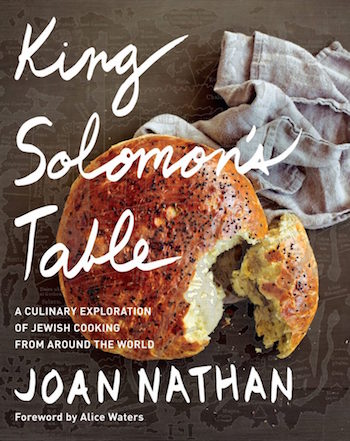Book Feature: Joan Nathan — Sitting at “King Solomon’s Table”
There are 170 recipes in King Solomon’s Table. Joan Nathan, a sort of culinary archeologist, tracks down the details of their origins to Biblical times.
King Solomon’s Table: A Culinary Exploration of Jewish Cooking From Around the World by Joan Nathan. Knopf, 416 pages, $35.
By Robert Israel

Author/journalist Joan Nathan discovered her métier over four decades ago. Once she produced her first book on Israeli food, she has written a steady stream of books and articles — for the New York Times and other publications — that chronicle Jewish kosher and culinary traditions, profiling those who cultivate, prepare, and consume Jewish food around the globe. Now a septuagenarian, she divides her time between Washington, D.C., and Chilmark, Mass. During a book signing this summer at a Cambridge restaurant, Nathan told me she has no interest in slowing down. She and her publisher are planning her next book.
But first, by way of background: Nathan, like myself, is a native of Providence, a small city in the smallest state that harbors an even smaller Jewish community. Her parents, the late Pearl and Ernest Nathan, were active in the Jewish and arts communities when I lived there; her father gave me copies of her books when I wrote reviews for the now-defunct Providence Phoenix. I became hooked on her vivid descriptions of her travels, and found the people she profiled fascinating. Here is an excerpt from a recent piece in the New York Times.
The walls of the Paradesi Synagogue in Kochi, India, are adorned with the history of the country’s Jews. On a recent trip there, I read an inscription suggesting that Jewish traders might have reached India from Judea, crossing the ocean during the reign of King Solomon – a journey of thousands of miles.
As for her presentation of recipes, I refer to her early books to this day when planning meals.
In her most recent study, King Solomon’s Table, Nathan chronicles an extensive odyssey, travels that were necessary to complete a project that took her six years to research: testing recipes, spending time in 15 countries in 5 continents. She relied on a strong network of contacts, at home and abroad, as well as her formidable skills as a sleuth. She begins her volume by closely examining one of the world’s oldest cookbooks, which dates from before the Christian era. (It is housed at Yale University.) Inspired by that encounter she begins her investigation, talking with farmers, religious leaders, cinnamon growers, diplomats, and cooks, discussing how these foods were prepared in antiquity and how they are being enjoyed today.
A look at life during the Biblical era, King Solomon’s Table is a volume filled with discoveries and surprises. There are 170 recipes in the book, and Nathan embraces the role of culinary archeologist, tracking down the details of their origins to Biblical times. Patriarchal stereotypes are debunked. Did King Solomon really have 700 wives and numerous concubines who cooked exotic meals for him? Nathan is not so sure, and neither is the archeologist she consults. Instead, she explores how King Solomon was a warrior, and how conquest dictated what he ate. One of the spoils of war were heaps of delicacies (as well as the services of the cooks that prepared those ingredients) imported into his palace — and onto his table — in Jerusalem.
What are some of the Biblical foods that we consume today?
Nathan reports that chickpeas, used as hummus and also as flour, were discovered in Jordan 8,500 years ago. Sesame was utilized 2,500 years ago; she suspects its origins were in China. Pomegranate and dates were made into pastes in Biblical times — today they are used as sweeteners in many recipes.

Author Joan Nathan — a sort of culinary archeologist. Photo: courtesy of the author.
Jews, expelled from many countries, learned to acclimate to the demands of nomadic living. They took local ingredients and adapted their use to the laws of kashrut (keeping kosher). Jewish cooks in El Salvador, for example, tinkered with recipes that originally called for potatoes (spuds are costly to import and can’t be grown easily). Instead, Nathan tells us, El Salvadorians use yuccas to make latkes (potato pancakes).
Nathan continues to collect stories and recipes. She wasn’t sure if the material will be for a new book or a series of articles when I talked to her in Cambridge. Among her travels the week before the book signing: visiting a synagogue and then interviewing families in Brattleboro, Vermont, who shared recipes whose ingredients were found in rural communities; going to the home of a woman who collects Biblical seeds from the Middle East and grows the plants in her garden in New London, Connecticut; teaching a master cooking class at Milk Street Kitchens in downtown Boston.
Robert Israel writes about theater, travel, and the arts, and is a member of Independent Reviewers of New England (IRNE). He can be reached at risrael_97@yahoo.com.

[…] means he overlooks Jewish cooking’s deeper roots. As defined by cookbook author Joan Nathan, Jews take great pride in their faith and this pride is reflected in their food. They were the […]
[…] means he overlooks Jewish cooking’s deeper roots. As defined by cookbook author Joan Nathan, Jews take great pride in their faith and this pride is reflected in their food. They were the […]